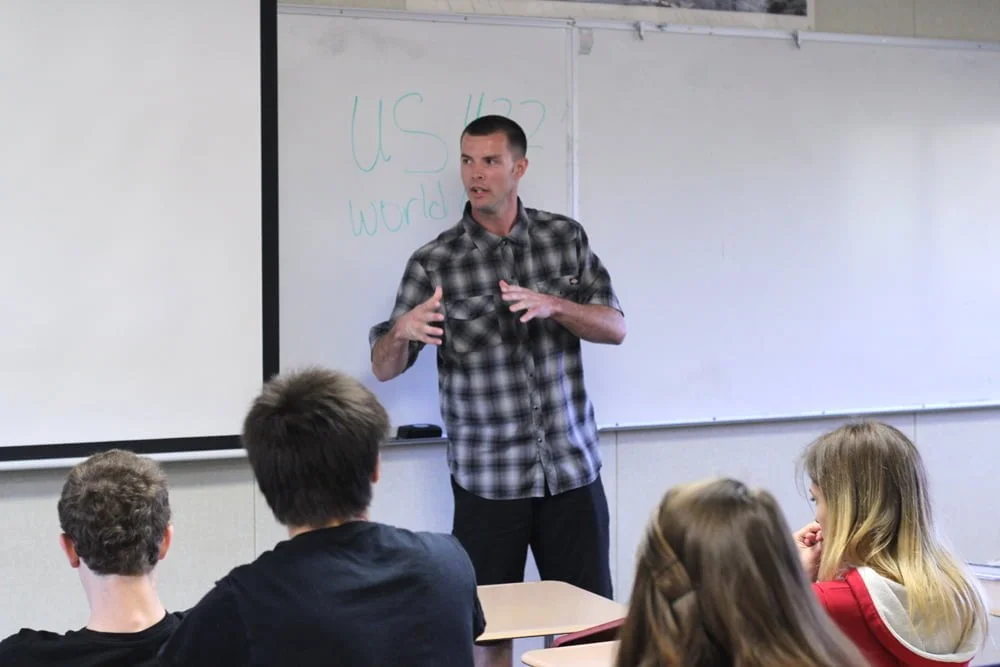
January 30, 2015

Growing up in Redding, Alex Tara says he always had feelings of being “less than” his peers, a cruel and unrelenting self-doubt that grew from being a short, chubby kid, his family’s struggles with alcoholism and his fears no one would accept him.
This fed his struggle with bulimia (“Eating disorders aren’t just a girl thing, they can be a guy thing too,” he explained) and depression that eventually led to abusing methamphetamines.
“(Drugs) filled that hole. All those feelings of being ‘less than’ went away, but it was a temporary fix that caused 13 years of destruction to my life,” he told a class of about 30 students at Pioneer High School in Redding Jan. 29, 2015.
Brave Faces Advocates Tell Pioneer High Students to Find Someone They Trust to Talk About Their Pain
After a two-year stint in prison, Tara entered the Addicted Offender Program, which changed his life, and today he’s sober and a district manager for a significant North State corporation.
“I had to learn other people weren’t the issue. I was the issue, and I needed help. I had to be honest about my problems,” he told the students. “Secrets can kill you. But if you find someone you trust to talk to about your problems, you can stop the power secrets hold over you.”
Tara and six other Brave Faces advocates spoke to more than 120 students who attended five classes at Pioneer High and a class at Freedom Middle School (which is on the same campus) , and they shared their stories of overcoming mental health issues, substance abuse and bullying.
Danielle Brewster, Education and Outreach Coordinator for Women’s Health Specialists, explained to the kids how racism and bullying she faced because of her Native American identity led her to become angry and pick fights. “I knew no one – not the teachers, not administration – was going to stick up for me, so I had to stick up for myself. But that led to me being labeled as a ‘bad kid.'”
Later, she explained she shed the label to become a community advocate for youth, but it wasn’t until later in life that she realized she needed treatment for the depression that stemmed from the traumatic events of her past.
“People saw me out in the community and knew me as a happy person, and they didn’t believe I could be depressed,” she said. “It was only after a visit with my doctor, and him calling me the next day that it felt like someone believed me.”
Later in the day, Greg Burgin Jr., Vice-Chair of the Wintu Tribe of Northern California, explained to the students how his identity struggles as a young man led him to join a gang and abuse alcohol and drugs. Eventually, he found healing when he came back to Shasta Lake and became involved with his tribe and Wintu traditions.
“All I want to do now is to help other people to make up for all the people I hurt when I was young and angry,” he said. “Now I do what my elders tell me: Live with compassion and use your heart to make the right decisions.”
Brave Faces advocate and Mental Health, Alcohol and Drug Advisory Board Member Steve Keyser ended the day’s presentations by holding up a 40-year-old black and white picture of him as a 16-year-old.
“I was the class clown because I needed to do anything to get attention to produce the neurotransmitters I’m missing,” he said. “I didn’t know the difference between good and bad attention. If you have an issue, you don’t have to wait till 57 to get the help you need like I did.”
Many students lingered after each class to talk to the Brave Faces individually, and a few talked to HHSA staff on hand about accessing services.
One student wrote on a comment card that she learned “the truth is pain and struggle is in everyone. It’s not where you are or your surroundings. It’s about the way you feel about yourself and how you cope with things.”
To have a Brave Faces speaker come share with your school, club, organization or staff meeting, contact Christopher Diamond at (530) 229-8484 or cdiamond@co.shasta.ca.us.
To learn to recognize the signs someone may be thinking about suicide, go to Know the Signs.

© Copyright 2021 – Stand Against Stigma – All rights reserved. | Websites By: prime42